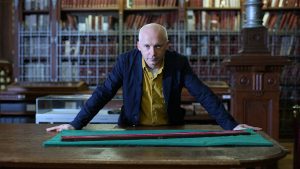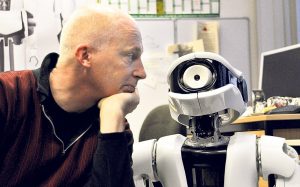It seems as if it were to happen sooner or later. And in what better place should such a discussion happen but in the left leaning world of academia. Recently, a professor of mathematics at England’s Oxford University made a serious proposal with regard to the future of artificial intelligence. For math professor Marcus du Sautoy, the next most logical step for artificial intelligence is to ensure that they have human-like rights.
Only in left leaning academia can such an idea seem to take hold. The professor fully believes that there will come a time when a machine will gain “consciousness” and, in effect, become human. Because of that eventuality, these AI must be given rights. Again, only in academia is it really believed that rights are awarded like they seem to believe self esteem is awarded rather than earned. Rights must be secured, usually by force; for no government, or dictator, will ever willingly surrender any. There isn’t even one instance in all of human history where rights were awarded.
Most scientists have determined the intelligence, not the consciousness, of a machine by using what is known as the Turing test. The test was created to determine if a machine could actually think. For the inventor, Alan Touring, a machine would actually have to convince someone that it was even conscious enough to be able to interact and to be capable of thought.
Turing never asserted that the process of thinking had universal applications. Turing merely asserted that if somebody, or some thing, could pass his test, then it should be recognized that thinking exists in one manner of form or another. Scientists, now are looking more at neural activity and du Sautoy asserts that even children have awareness of self, are conscious, every time they even look in a mirror.
But human children are hardly AI.
For du Sautoy, advances in mathematics and neuroscience now demands that artificial intelligence be looked at differently from being mere automaton robots. He thinks that there can now be a greater understanding of what he considers to be machinery that lies beneath consciousness.

Oxford University professor of mathematics, Marcus du Sautoy. He is also pictured above contemplating the consciousness of a nearby AI.
“The fascinating thing is,” says du Sautoy, “that consciousness for a decade has been something that nobody has gone anywhere near because we didn’t know how to measure it. It’s a bit like Galileo and the telescope. We now have the telescope into the brain and its given us an opportunity to see things that we have never seen before.”
This seeing more than before, du Sautoy presses, means that robots and AI just may have intelligence and even be self aware enough to have consciousness.
“It’s getting to a point where we might be able to say that this thing has a sense of itself,” said du Sautoy. “And maybe there is a threshold moment where suddenly this consciousness emerges and if we understand these things are having a level of consciousness, we might well have to introduce rights. It’s an exciting time.”
Nice that he wants to “introduce” rights but, as usual, academics lives in their own little bubble worlds. Rights, generally speaking, are wrenched from ruling authorities usually by some manner of force. That is what can be easily observed. That is what usually happens in the real world of things. I suppose we will all just have to wait an see how things shake out in the next several decades or three.
PHOTO CREDITS: The Telegraph (London)

